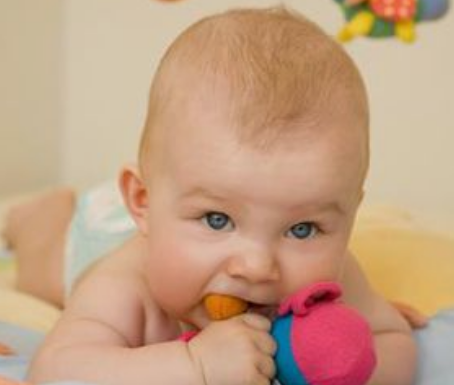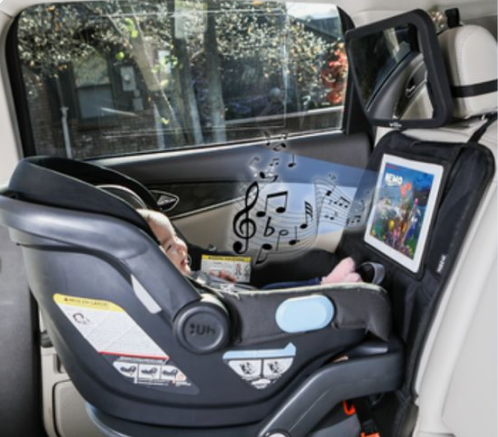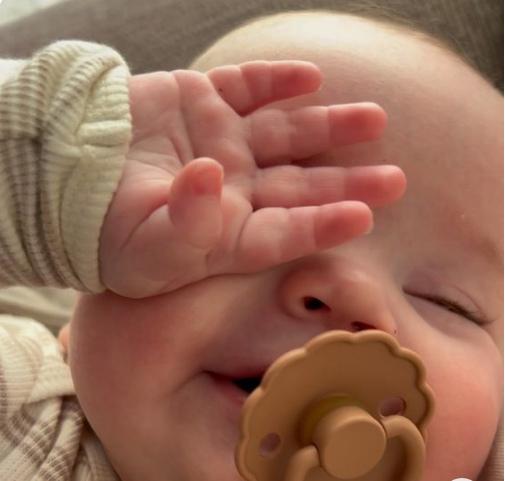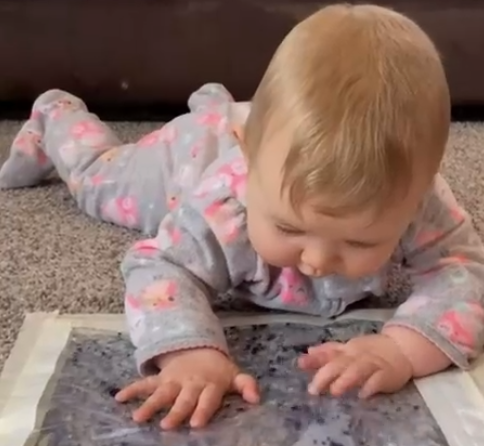Why do babies put everything in their mouths?
By: evelyn parkar * Updated 10 August 2024
Are you worried your baby will try to put everything in his mouth, whether it’s his toys, clothes, a blanket, or empty plastic food containers? You might be tired of constantly keeping these things away from him, fearing something small might get stuck in his throat. But you’ll be surprised to know that allowing your baby to explore objects with his mouth can benefit him.
Yes! Your baby’s immune system develops significantly during the first year, and he utilizes all his senses—smell, sight, taste, and hearing. The best way for him to engage these senses is through his mouth. With their tiny hands, babies grasp things, strengthen their grip, and instinctively put them in their mouths. This entire process is called mouthing.
Mouthing is also great for your child’s cognitive and physical development. During the first six months, babies discover things through mouthing, allowing them to learn about texture, shape, and taste.
Mouthing is so important that my child didn’t speak a word properly until he was two, so I took him to speech therapist Lindsay Hockey, who said, “Have you stopped your baby from mouthing? That’s the question for me.” It was extraordinary how mouthing is related to speech and speaking. Then he explained to me that one of the reasons why most children talk late and are picky eaters is the lack of different things, textures, and tastes.
I got nostalgic after reading about its benefits, and a nostalgic memory came to my mind when my mother forbade my 7 to 8-month-old younger sister to put anything in her mouth, saying that mouthing was not suitable for her health. I remember that at that time, people believed that putting things in the mouth would cause an upset stomach. The people of that time needed to learn more information. And I always forbade my sister from putting her hands or toys in her mouth.
At that time, I was still young, so I thought it was just a sibling thing. I hope my sister will forgive me for scolding and sometimes secretly slapping her. At that time, I was proving to be a good sister, and that beating was only for her betterment and care. (hehe🤭)
So, let’s move on to the article, and I will tell you from my experience why your baby puts everything in his mouth. Is baby mouthing safe? What are its advantages and disadvantages? Which you can hardly find on the internet.
When mouthing begins
You need to know that when your baby is 3 to 5 months old, they tend to grasp things, and once their grasp is firm, they start to learn things and put them in their mouths. The process of discovery begins. At newborn age babies start exploring their body parts, read our guide on when does newborn stage ends.
Why do babies put everything in their mouths?
When I asked the mothers in my WhatsApp group if they have ever wondered why children put everything in their mouths, almost 80% of them answered in affirmation. Many of them even shared that their children used to put even cat’s tails in their mouths. This mouthing of their children has made them worried, understandably so, as taking care of a baby, picking up things, and washing them can be frustrating. Therefore, I have decided to spread awareness among all the mothers that they should not be frustrated with their babies mouthing, but rather, they should understand the reason why children put things in their mouths.
Baby used to put his mouth and hands in your womb too, so how is it possible that he will leave his habit so soon after coming to the outside world? The National Library of Medicine research baby explores their body through mouthing.
Here are the main reasons why babies do that
They want to explore the world.
When we buy clothes, with the help of fingers and hands, we estimate the fabric of the skirt or the shirt. Like this, children also estimate the structure of things with the help of their fingers and cute hands.
They are teething
When children reach the age of teething, they also put things in their mouths to reduce their pain, which is a source of comfort for them. For soothing themselves babies start biting everything near them including you. learn how long does teething pain last.
They build their immune system.
When children pick up a piece of food from the floor or their toy and put it in their mouth, their immune system is active and tries to recognize viruses, bacteria, and other germs.
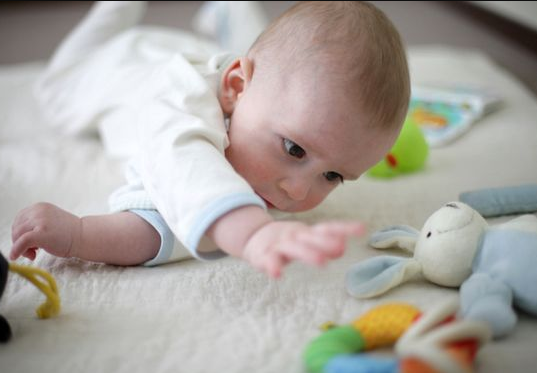
They are craving for snacks
During pregnancy, the baby’s teeth are hidden in its gums. Due to this, children like to eat sweet things more than salty and sour things. So, they put their hand in their mouth to decrease cravings.
Is baby mouthing safe?
It is safe to put things in a child’s mouth as long as they don’t put a lot of dirt, dust, or something in their mouth that could cause it to get stuck in their throat. It is safe, but at the same time, you have to be alert.
Choking
Mouthing is safe, but it does not mean that children pick up everything and put it in their mouths. You have to pay attention to the toy parts that contain small wheels, which I have often noticed ducks put in their mouths. Pieces of hard meat, pieces of apples in fruits, from which many suffer from choking.
Keep away all the poisoning things
Many household items are poisonous. Children are ready to reach every corner, pick up even the most minor thing, and put it in their mouths. Here is the list of these poisonous things.
- dishwasher
- bug spray
- batteries
- nail paint remover
- alcohol
- toiletries
- supplements
- furniture polish
- vitamins
- detergent
- bug spray
Please make sure to keep all these things away from babies.
Pet food
How can children eat a cat’s food as soon as they put their mouths up to the cat’s tail, but that food can be harmful to our baby or cause stomach upset and food poisoning? Also, avoid feeding any stale food to the baby.
Benefits of baby – mouthing
There are lot of benefits of mouthing lets discuss one by one.
- Babies will be ready for solid food in the future
According to research, taking toys into the mouth of the child makes it easier for him to eat food of different tastes, textures and temperatures in the future. And it prevents them from becoming too choosy and picky eaters in terms of food.
- Mouthing helps babies to strength their jaw, cheek and tongue
When children do mouthing, they rotate and explore any toy or object of different structure in their mouth in different ways, this makes their tongue, jaw and mouth muscles strong.
- Mouthing gives them soothing.Babies mouths to calm themselves, mouthing soothes their gums, and, especially when they are suffering from a toothache, teething is a painful process in which babies try to bite everything. In such a situation, their hearts should not be broken. Instead, keep a clean cloth in the refrigerator and rub it on the baby’s gums. And read how do you help a teething baby sleep.
Conclusion
Many researchers and pediatricians have confirmed that mouthing is very important for babies. It is essential not only for the growth and development of the child but also for the child’s motor skills. The only thing to remember is that the child is putting something in the mouth, which is not.
FAQ’s
At what age do babies stop putting things in their mouths?
Children typically stop putting things in their mouths and chewing by the age of two. However, it’s important to remember that every child is different. Some children may continue to put non-food items like pencils and collars in their mouths. You might recall a child in your class who had a habit of chewing on the back of a pencil, a behavior that was unique to him.
How do I stop my baby from putting everything in his mouth?
It’s completely normal for children to learn from their environment and taste flavours, which is why they put everything in their mouths. This behavior also helps them improve their motor skills. While you can only partially baby-proof your home, it’s important to monitor your child and keep things away from them to prevent them from putting anything harmful in their mouth. When my son John learned to walk, he even started eating my pet parrot’s food.
Now I started to explain at that time that it is dirty gently and you should not eat it. In this way, John began to say by himself that it was messy, and thus, his habit changed. Many times, when I saw Jack near the parrot cage, I would try to change his attention. As parents, we have a crucial role in guiding our children’s behavior. It’s important to keep potentially harmful items out of reach of children. Additionally, if possible, try to avoid eating inedible items in front of them. Children are keen observers and often imitate what they see. By setting a good example and showing them what is safe to eat, we can help guide their behaviour.
Why is my baby chewing everything but not teething?
It’s perfectly normal for most children to chew their hands in the first 60 months of their age. They often do this because their teeth are about to come out, but also to test themselves and relieve boredom. Yes, children get bored too. Most of the time, they don’t even realize it, and they put anything in their mouth out of habit. Children try to chew by placing their toes, even their collared shirts, in their mouths. you just distract them by playing some songs or colors or other subjects. but the overstimulated TV shows are not good for your little one.
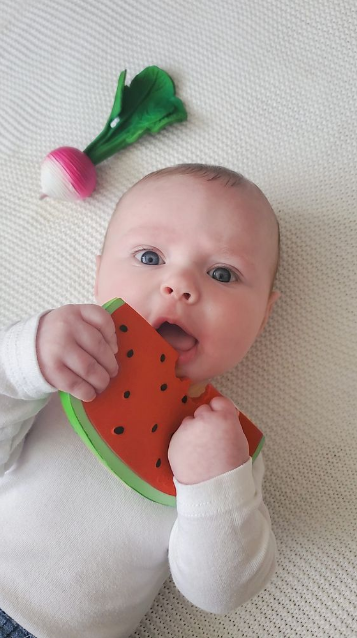
Is chewing on things part of autism?
Repeated chewing can provide comfort for children with autism. This behavior, often seen in children with autism, can lead to them swallowing non-food items like paper or soil. Children chew objects as a coping mechanism to calm themselves or reduce their stress. However, this can make it challenging for them to process and respond to information from the environment. As caregivers and educators, your understanding and support are crucial in helping these children navigate their unique challenges.
Why is my baby aggressively eating hands at five months?
Your baby also chews his hands to explore. If a 5-month-old is chewing his hands a lot, he may be teething. And he is hungry. But if there is none of these things, then he is only exploring his body. This behavior is completely normal for a baby of his age. Because our children are not born with the discovery of their body; instead, they gradually explore their body parts. You may have noticed that your 1- or 2-month-old baby often grabs his hair or twirls his fingers over his eye, which means that babies are innately in control of their bodies and are not born with. Instead, they discover their body over time and learn to control it. So don’t worry too much about putting your hand in your mouth and chewing it badly.
I believe these information helps you a lot if you wanna know more information so let us know in the comment section or email.
